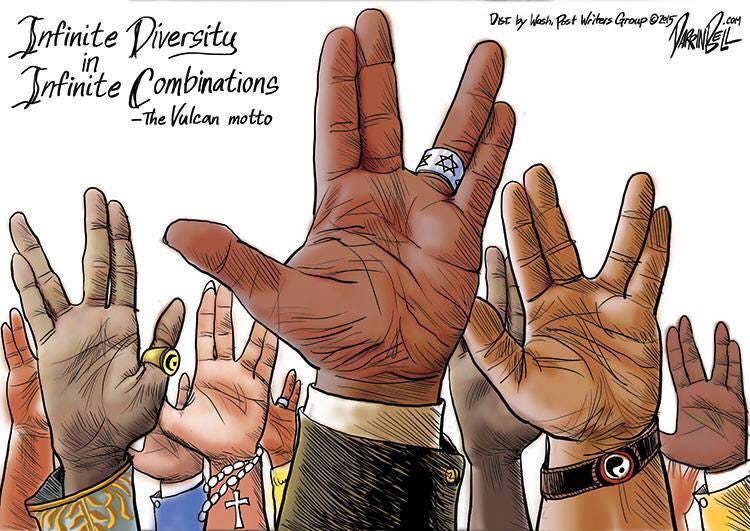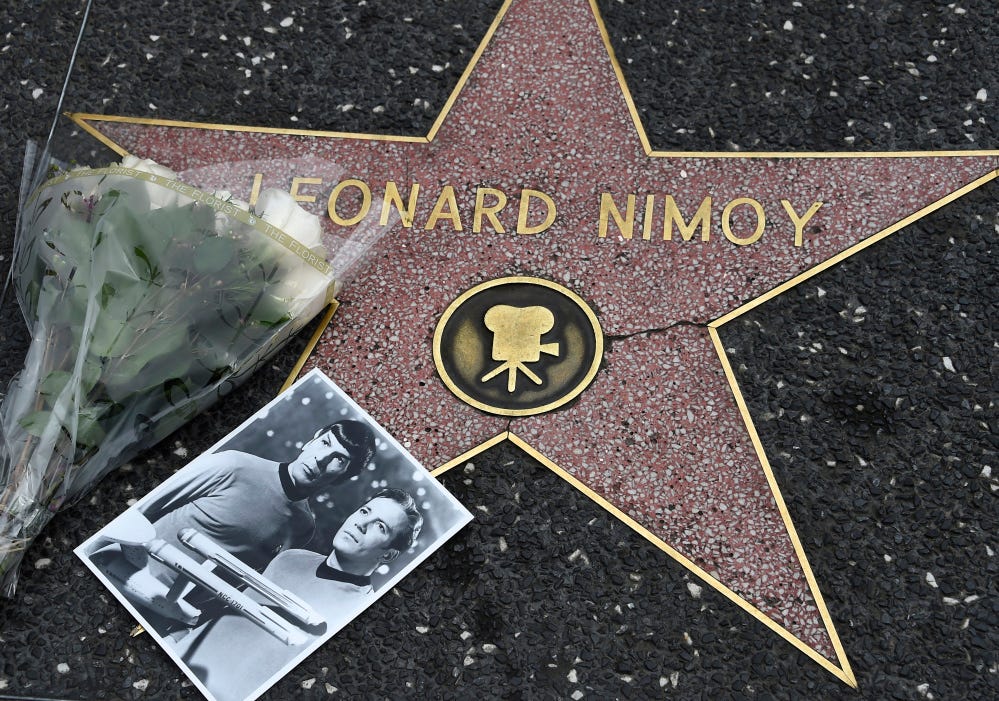
Am being reminded of Stark Trek this weekend as one of the great actors of the original series, Leonard Nimoy, bringing to life the iconic, logical, alien Spock, just passed away.
Watching Star Trek as a child was in many ways the beginning of my love for future and the potential we have as humans. It inspired me to read science fiction, and to not have my sight set on the issues of today, but on the solutions of tomorrow. It also inspired me to live a life where I wanted to dare to boldly go where nobody had gone before.
Having lived in Los Angeles for many years, one of my favorite questions to ask people was what movie they knew that portrayed a positive human future. To this day, I have not received a satisfactory answer. The only answer that people came up with that was close was Star Trek.
Star Trek inspired me early on to think differently about how we might one day solve the issues of engaging humans in meaningful activity while providing for their basic needs.
Thinking about my relationship with Star Trek over the last day, I was reminded of the first time I saw Deep Space Nine and how I was excited about how the OPS, their command central, could serve as a model for future company head quarters — companies that would have to react to instantaneous information collaboratively — foreshadowing the immediacy of today’s world of instant information and social media.
That was more than twenty years ago, but I do find that Star Trek, even before then, in the Original Series and the Next Generation, shaped my concept of work and the future of work in many ways.
Some of the concepts in the original series that stood out for me that relate to the future of work:
Purpose
Everyone on the Enterprise had a clear overall purpose: Boldy go were no man had ever gone before. Explore the edges of the universe. There was no question about that. And if a question arose as to how to proceed, this purpose could always be called upon. It guided everyone on board and served as the foundation for everything they did.
Any endeavor needs a clear purpose. Without it, or if it is an impoverished one like making money (which is one possible measure of success, not a purpose), the company will fail eventually. As we look to the future of work, we need to ensure that we create organizations with clear and meaningful purpose.
Breaking the rules
There were clear guiding rules on the Enterprise: e.g. how to engage with less advanced civilizations they encountered (am wondering if they are still considering us a “dangerous, savage child-race” — which we would probably deserve considering how we are treating each other and the planet). While there were rules, they were also broken on occasion, if they interfered with purpose or with higher human values.
It’s good to have clear rules. At the same time, they need to be evaluated in light of what is really going on. They are guidelines, not set in stone, and it is important to break them when required, or when they interfere with higher purpose or values. This is one reason we need to keep our AI in check. Computers follow rules, and rules only. Humans know when to break them. As we look to replace more and more jobs with robots and artificial intelligence we need to make sure that we allow for variation and overrides.
Function
Everyone on board the Enterprise had a function. There was a hierarchy, but while there was technically a command and control structure, the hierarchy and functions were based on interest, aptitude and experience. It was rare that rank was pulled, that hierarchy had to be invoked. Everyone knew what to do, and everyone had creative agency within their capacity.
Humans are diverse and not everyone is an athlete, not everyone can code, not everyone can do everything. But everyone can contribute. Within that, everyone can be a leader in their function. We need to understand how to find our function, our unique expression of self, and how we tie into a larger whole, how we can lead and collaborate at the same time.
Dimensionality and Interests

While everyone on the Enterprise had a particular function, and some were close to being stereotypical, we were also introduced to characters with dimensionality and interests. Several of the characters would quote literature, show interest in arts, and had hobbies that were often unrelated to their function. Spock, logical to the core, e.g. had a lifelong interest in art, literature, poetry, and music (he played the Vulcan lute); Zulu, the weapons and navigation expert had a hobby of botany…
We live in a world of specialists, but specialization is for insects. While much of our schooling is designed to drive toward “picking a major”, we need to create more multi-dimensional humans, humans with interests outside of their specialization. That will create crucial cross-fertilization and create access to genius. It is not by chance that a high proportion of Nobel laureates played instruments. We need to ensure to include art and other non-technical disciplines into how we raise our young to create a more well rounded workforce.
Diversity

Star Trek made history with the first interracial kiss on American television. Given that the original series was made in the sixties, it was way ahead of its time in showing diversity in the work force. The crew was made of up of multiple ethnicities, included an alien and women in leadership positions — not just as counselors, holding down the emotional intelligence of the crew, but also as engineers, and in later iterations of the series even as weapons experts.

Insight and innovation comes from diversity. We will never solve today’s and definitely not tomorrow’s issues with a homogeneous culture. The idea of white males running the world is as obsolete as the systems they have created. In the next thirty years America will become a nation of color. Half of the world’s population already lives in Asia. The future of humanity is beyond our current categorizations. And while women today face glass ceilings and are even leaving the tech industry in Silicon Valley due to the hostile environment, we are in crisis and in crisis we tend to look for female leadership. In addition, feminine attributes like compassion and empathy will be increasingly important in a world where AI replaces much of our left brain functioning.
Collaboration
All those missions the crew of the USS Enterprise successfully completed relied on collaboration. All those different functions, those diverse characters needed to work together to succeed using their varied talents. It was not always the good Captain Kirk who saved the day. Oftentimes, his brash nature got him in trouble, and it required the more silent ones to step in and rescue him.
While innovation starts with “I”, with the individual, nothing can be achieved in isolation. We need each other. The world’s problems are way to complex for any individual to find a solution on their own. We do require each individual to step up to leadership, to be willing to stand on their own, but only if we reach out and connect with others will we be able to thrive. Collaboration is what allowed us to get to where we are today. Working together was the number one strategy for success while hunting in the Savannah of Africa, and it will continue to be key as we reach toward the stars.
Humanness
The one thing that stands out in looking at the work environment depicted in Star Trek, is the friendship among the crew. The human connections — even with the alien Spock. Most significantly characterized by “Bones” McCoy and Captain Kirk, their humanness, including all the fallacies, faults and prejudice was what in all likelihood greatly contributed to the success of the show. And even more so, their continued growth. Each episode showed us a transformation, a growth in character, supported by friendship and deep caring for each other.
As we are looking to a world more and more dominated by technology, it will be our human capacity for growth that will save us. While many of us are still all too human, each of us has the potential to be authentic and consider ourselves a verb rather than a noun, a process rather than a static entity. We are evolution. If we allow ourselves to be vulnerable and real with each other, allow ourselves to be human, we can overcome the challenges of today and together boldly go into a future where no human has gone before.

